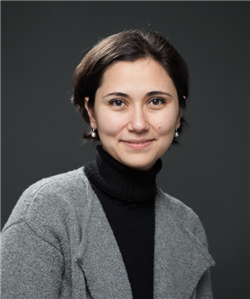As Ashley Grossman MD, FRCP, and Zeynep Madak-Erdogan, PhD, prepare to become the next editors-in-chief of Endocrine Reviews, and the Journal of the Endocrine Society, respectively, they spoke with Endocrine News about their goals for the future of these prestigious journals.
Toward the beginning of summer, the Endocrine Society appointed two new editors-in-chief of its journals: Ashley Grossman MD, FRCP, of Barts and the London School of Medicine in London, U.K., has been named the next editor-in-chief of Endocrine Reviews, and Zeynep Madak-Erdogan, PhD, of the University of Illinois at Urbana-Champaign in Urbana, Ill., has been named editor-in-chief of the Journal of the Endocrine Society (JES).
“This is a very exciting time for our Society as we introduce two new editors-in-chief who are more than qualified to carry our journals forward in impact and growth,” says Endocrine Society President Carol Wysham, MD, of the Rockwood/MultiCare Health Systems in Spokane, Wash. “Drs. Grossman and Madak-Erdogan both have extensive journal experience and have brought forward great energy and creative ideas for advancing our journals.”
Journal of the Endocrine Society is an Open Access journal providing rapid publication of clinical research, clinical practice information, and basic research in all areas of endocrinology. Mini-reviews, commentaries, perspectives, case reports, and articles about images, databases, and methods are also featured. Articles undergo a streamlined peer review and are provided with article-level metrics.
Endocrine Reviews publishes bimonthly, including concise timely reviews updating key mechanistic and clinical concepts, as well as more comprehensive, authoritative review articles spanning both experimental and clinical endocrinology themes. Endocrine Reviews considers topics that inform clinical practice based on emerging and established evidence from clinical research as well as reviews of advances in endocrine science emanating from studies of cell biology, immunology, pharmacology, genetics, molecular biology, neuroscience, reproductive medicine, and pediatric endocrinology.
Endocrine News caught up with both new editors of these prestigious journals to find out what attracted them to these new roles, what sets these journals apart, and their visions for the future.
Embracing a Changing Medical and Social Landscape
Madak-Erdogan is director of the Women’s Health and Metabolism lab at the University of Illinois, Urbana-Champaign. Her lab focuses on understanding how hormones and metabolism affect women’s health. Her research centers around using animal and 3D-engineered models, with advanced statistical and computational analysis, to understand how nutrients, environmental toxicant exposures, and hormones impact metabolic health and hormone-dependent cancer outcomes. She won the Endocrine Society Early Investigator Laureate Award in 2015, she was an NIH Health Disparities Research Institute Scholar in 2018, and she received the Paul Funk Award for Faculty Excellence in Research in 2019.
“As editor-in-chief, I will advance JES’ reputation as an Open Access publication and maintain the journal’s scientific and literary quality,” Madak-Erdogan says. “We will reach even more clinicians and basic scientists worldwide with the journal’s innovative research in all areas of endocrinology.”
“As editor-in-chief, I will advance JES’ reputation as an Open Access publication and maintain the journal’s scientific and literary quality. We will reach even more clinicians and basic scientists worldwide with the journal’s innovative research in all areas of endocrinology.” -Zeynep Madak-Erdogan, PhD, director, Women’s Health and Metabolism Lab, University of Illinois, Urbana-Champaign, Champaign, Ill.; incoming Editor-in-Chief, Journal of the Endocrine Society
Madak-Erdogan’s path to endocrinology started in Benita Katzenellenbogen’s laboratory at the University of Illinois. There, Madak-Erdogan was involved with projects related to steroid receptor action, hormone-positive breast cancers, and regulation of systemic metabolism by estrogens.
Before her role as editor-in-chief of JES, Madak-Erdogan was coeditor-in-chief of Endocrine and Metabolic Science. “When the call for [editor-in-chief of JES] came up, I felt like it was my time to serve the Endocrine Society,” she says. “Working with such an established group is so rewarding, and also enables you to avoid all sorts of issues associated with journal recognition – lower submission and citation rates, impact factor.”
“I am thrilled to have the opportunity to work with Dr. Madak-Erdogan,” says Stephen R. Hammes, MD, PhD, chief of the Division of Endocrinology and Metabolism at the University of Rochester School of Medicine and Dentistry in Rochester, N.Y., and recently appointed deputy editor of JES. “I have known her for years and have always respected her brilliance, enthusiasm, and eye for the big picture. I am confident that she will bring JES to the next level, and I am happy to be along for the ride.”
Madak-Erdogan definitely has her eye on the big picture, and she’s determined to take the relatively new JES to the next level. “I envision JES to be the premier Open Access journal for the field, where high-quality clinical, translational, and basic science articles are published,” she says. “Once we get our impact score established, we will attract more articles spanning a diverse array of topics in endocrinology.”
She should have everything she needs to get there. Madak-Erdogan tells Endocrine News that there are many advantages to JES being a Society journal. “For example,” she says, “I expect higher quality submissions from high-quality labs that would otherwise hesitate submitting their articles to newer/lesser known journals.”
And she already has plans to use JES’s rapid publishing schedule to stay on the cutting edge of endocrinology research and clinical practice information, especially as the world so rapidly changes around us. “Together with the editorial team,” Madak-Erdogan says, “we are planning several special issues that will bring articles on endocrinology issues that are relevant to our changing medical and social landscape.”
Forefront of Translational Medicine
Grossman is an emeritus professor of endocrinology at the University of Oxford and professor of neuroendocrinology at the University of London in the U.K. who has trained many leading endocrinologists. He won a 2020 Laureate Award from the Society for his outstanding mentorship. His research focus is the pathogenesis of endocrine tumors, including adrenal, pituitary, and neuroendocrine tumors, and he’s published more than 530 peer-reviewed research papers and 420 chapters and reviews.
“It’s a huge honor and quite intimidating,” Grossman says, noting that he’s served as editor, sub-editor, and deputy editor for various journals, “but this is the big one with a massive impact.”
Grossman says that the real challenge when taking over the helm of an already-excellent journal is to make it even better, and he’s got some views on how to make that happen. For one, he’s surrounded himself with a dynamic editorial board, editors from around the world, not to mention a deputy editor whose name Endocrine Society members may have heard before.

“It is a tremendous privilege to be working closely with Dr. Grossman, a distinguished endocrinologist of international stature as a deputy of Endocrine Reviews,” says Society past-president E. Dale Abel, MD, PhD, chair of the Department of Internal Medicine; director, Fraternal Order of Eagles Diabetes Research Center; and professor of medicine, biochemistry and biomedical engineering at the University of Iowa, Carver College of Medicine, in Iowa City. “I believe that our respective backgrounds will bring a broad perspective that will direct the content of our flagship journal. I was honored and humbled when Ashley reached out to me to consider partnering with him in this important role. In all of our interactions to date, it is very clear to me that Dr. Grossman intends to be inclusive in his approach to managing the journal and will be rigorous but fair. We seek to partner with global experts in endocrinology to provide authoritative articles that will cover the breadth of our discipline and will be of broad interest to the field. I believe that together, we will advance the mission of Endocrine Reviews and see its influence rise.”
Grossman says he’s also pleased to see that the Society is investing in more illustrations, figures, and diagrams, which he says will improve a journal like Endocrine Reviews, where the reviews can be long and complex. “Figures and diagrams are absolutely vital to keep pieces interesting and summarize what’s going on,” he says. “I think that, between the editorial boards and the deputy editor and Endocrine Society’s inputs, it will be quite exciting times.”
And while Endocrine Reviews is renowned for its longer articles, Grossman sees a place for shorter, more cutting-edge pieces that will be highly read. “I’d also like it to have some of the reviews where people would sit down with a cup of coffee or a glass of wine and simply read it, even if it’s not their own area, saying, ‘Well, I wonder what’s happening in this area?’ and then get a really cool review that they can go away with.”
Going forward, Grossman sees a blend of commissioned articles and articles that were submitted as suggestions from Endocrine Society members, and an editorial board that will be open to all recommendations. “If it’s a really interesting area and they really feel our readership will appreciate it, please send it in,” he says. “We’ll be absolutely fair, and if we really think it’s going to be something which will affect our readership, then we’ll push it ahead.”
“My vision for Endocrine Reviews is for all articles to reflect the most exciting and novel aspects of basic medical science and to be intertwined with their impact on clinical medicine and patient care,” Grossman continues. “The fusion of basic knowledge with an understanding of its clinical relevance is one of the most intriguing and challenging areas of medicine. Endocrine Reviews is ideally situated to respond to that challenge and be in the forefront of translational medicine.”
Grossman and Madak-Erdogan will each serve three-year terms starting January 1, 2022.
Bagley is the senior editor of Endocrine News. He wrote the September cover story on Stanley Andrisse, PhD, MBA, and his remarkable transformation from troubled youth to renowned researcher.

 “As editor-in-chief, I will advance JES’ reputation as an Open Access publication and maintain the journal’s scientific and literary quality. We will reach even more clinicians and basic scientists worldwide with the journal’s innovative research in all areas of endocrinology.”
“As editor-in-chief, I will advance JES’ reputation as an Open Access publication and maintain the journal’s scientific and literary quality. We will reach even more clinicians and basic scientists worldwide with the journal’s innovative research in all areas of endocrinology.”